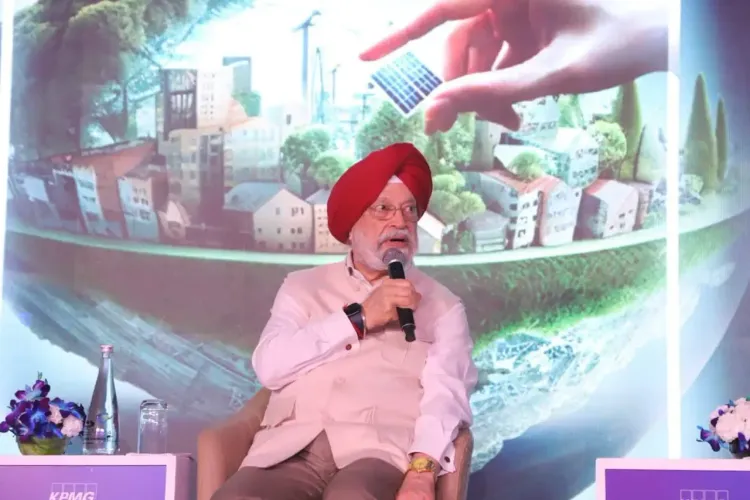Will the Government Reassess the Ethanol Blending Initiative? Hardeep Singh Puri

Synopsis
Key Takeaways
- India achieved a 20% ethanol blending target ahead of schedule.
- The government will assess future targets based on ecosystem adaptability.
- Concerns about E20 fuel's impact on vehicles have been dismissed by officials.
- Reforms in the energy sector aim to attract international investment.
- India is set to expand its energy infrastructure significantly.
New Delhi, Sep 16 (NationPress) The Indian government will evaluate the current status of the nation’s ethanol blending initiative prior to establishing new targets, stated Union Petroleum and Natural Gas Minister Hardeep Singh Puri on Tuesday.
Puri announced that the country has successfully met the 20 percent ethanol blending target in petrol, six years ahead of its designated timeline.
“Our goal was to reach 20 percent blending by 2030, and we have accomplished this ahead of schedule. We will now examine the next steps,” he commented, noting that any future targets will be determined based on an assessment of how the ecosystem is adjusting.
The ethanol blending initiative was introduced to decrease India’s reliance on crude oil imports and to lower carbon emissions by incorporating ethanol into petrol.
India recorded a 1.4 percent blending rate in 2014 and achieved 10 percent in 2022, five months prior to the deadline.
Concerns have been voiced by vehicle owners and manufacturers regarding the effects of E20 fuel on engine performance and efficiency.
Puri dismissed these worries, asserting that claims about ethanol damaging engines are unfounded.
“If someone drives from Delhi to Gurugram daily, there are 21 factors that could cause the vehicle’s efficiency to decline by 1–2 percent. Biofuels are not at fault,” he stated.
Emphasizing broader reforms in the energy sector since 2016, Puri referenced the Oilfield (Regulation and Development) Amendment Bill, which he claimed has made exploration and production more appealing to global investors.
He noted a resurgence of interest from international oil companies in collaborating with Indian PSUs like ONGC to revitalize offshore oil fields, including Mumbai High.
Puri praised Prime Minister Narendra Modi for inaugurating India’s inaugural bamboo-based ethanol production facility in Assam, calling it a significant milestone in the nation’s energy agenda.
He further stated that India is on course to enhance its energy and industrial capabilities, aiming for 2,200 global capability centres by 2030.
These centres are projected to create 2.8 million jobs and generate over $100 million in revenue.
Regarding green hydrogen, the minister expressed confidence that India could lower its costs to below $3 per kilogram, making it competitive on a global scale.
“Prime Minister Modi has transformed geopolitical challenges into opportunities. India is poised to surpass Germany in growth rate soon,” Puri concluded.










